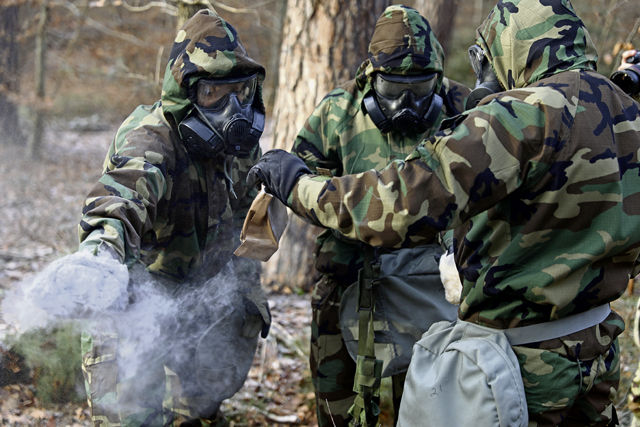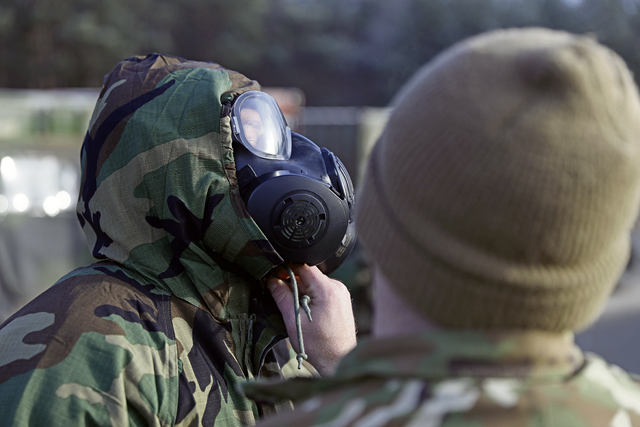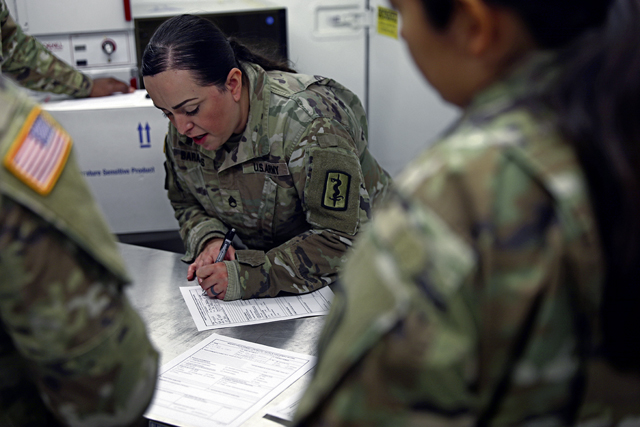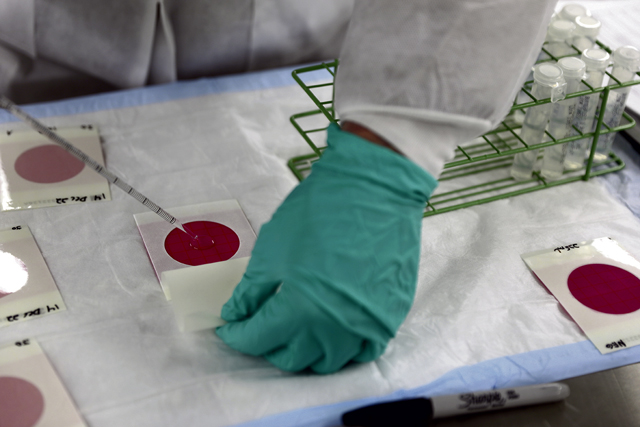
The 64th Medical Detachment Veterinary Support Services held a laboratory exercise on Rhine Ordnance Barracks from Dec. 13-15; where Soldiers were able to develop their skills and expand their knowledge in their work field.
LABEX events are held to not only benefit the Soldiers but also allow their supervisors to see what could be improved for the coming future.
“We are hoping to use this training to prepare us for our validation exercise in February,” said Staff Sgt. Ruth Barajas, 64th MDVSS food procurement laboratory team non-commissioned officer in charge. “We hope to validate not only personnel but all team equipment to move towards participation in global health engagements with other European countries.”
The event was conducted over three days with a new task each day. On the first day, the Soldiers went through chemical, biological, radiological, nuclear detection and decontamination. The second day, substance sample collection, lab submissions and sample plating was demonstrated and practiced. On the third and final day, Soldiers received their sample results and conducted a presentation to leaders.

“I hope they have gained a greater knowledge regarding proper laboratory practices, procedures and will be able to successfully apply them during real world events,” said Barajas.
Leaders want their Soldiers to succeed and gain more understanding of what it is they do when it’s time for their skills to be tested in real world events.
“They benefit from this because they are more prepared and more confident to carry out their job responsibilities more independently, more competently and more professionally in my opinion,” said Sgt. Felicia Silva, 64th MDVSS FPLT team leader. “Because we’re always rotating and doing different missions, we don’t have time to think to ourselves and say, ‘Hey, are we really proficient at our job?’ So this type of training provides proficiency, efficiency, skill development, confidence and overall professionalism.”
The Soldiers see the benefit for themselves more than anything, from learning new techniques, to seeing things that they’ve never used before. There’s benefit for both leader and Soldier.

“We’re able to give the commanders of the unit the information they need because we have a field lab set up, it gives us the utility in the field to allow us to test samples and relay that information to those commanders,” said Sgt. Deonte Collins, 64th MDVSS, team 5 NCO. “It gives us the opportunity to give them the knowledge on any situation with the food that they’re eating and any possibility of contamination if need be.”
There’s a lot of coordination that goes into these events. Leaders have to communicate with other units to coordinate the needs of the exercise and be able to receive the supplies needed for proper training.
“We had to go through the 512th Field Hospital to get certain equipment needed to get our generators hooked up, our heaters working, we had to work with the Training Aids Services Center in Kaiserslautern to get lab equipment as well,” said Silva. “We had to work with the dining facility here to make sure we were able to conduct our inspection and take live samples from their facility to be plated in our lab. As well as CBRN personnel so they can give training on how to properly put on mission oriented protective posture gear and decontaminate food.”

Collins said that he hopes more events will be held in the near future because he can see the huge upside to it, not only for himself but for his fellow Soldiers.
“I think the training has been interesting with doing new things, from the CBRN and decontaminating food in our MOPP gear in a tactical portion, to the lab portion which will be more hands-on, so it’s two different dynamics from our job,” said Collins. “I think this will help the unit become more productive and allow us to get a lot more done in more time.”
The LABEX allows leaders to see the benefits that can be gained such as influencing other units to take notice and noticing Soldiers reactions from training events like this.


